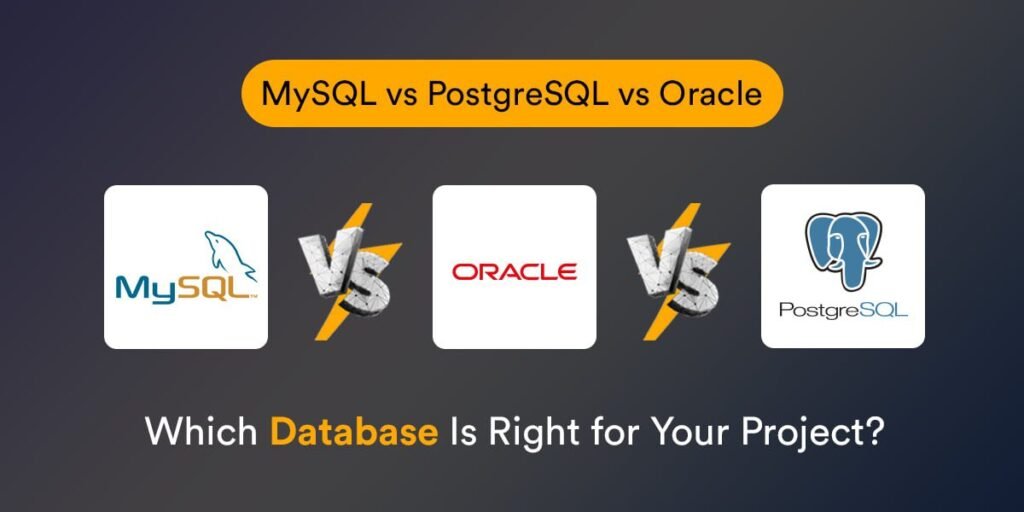When comparing databases for your next project, understanding the key differences between Oracle, PostgreSQL and MySQL is crucial. Both databases offer unique features and capabilities that cater to different needs. This comparison will help you decide which database management system (DBMS) is right for your application.
The sheer number of databases might make it difficult to zero in on the one that will best serve your needs.
In this in-depth analysis, we’ll take a look at three well-known DBMS options: MySQL, PostgreSQL, and Oracle. There are advantages and disadvantages to each of these databases, as well as specific uses for each. We’ll break down each choice into its component parts so you can compare and contrast features, performance, scalability, community support, and pricing.
Whether you’re starting a tiny project, creating a large business application, or looking for a database with sophisticated functionality and scalability, this comparison will help you make the right choice. Keep in mind that the best course of action will vary from project to project, resource to resource, and budget to budget.
So that you can choose the best database for your project, we’ll go into more depth about three popular options: MySQL, PostgreSQL, and Oracle.
What is MySQL?
MySQL is an open-source RDBMS that has gained widespread popularity due to its user-friendliness and simplicity. It has found widespread usage in low-budget companies, as well as smaller and medium-sized enterprises online.
MySQL is well-suited to programs that need to quickly retrieve data because of its high performance under read-intensive workloads. It has extensive community backing in the form of documentation, tutorials, and plugins, and it is compatible with a broad variety of programming languages and platforms.
MySQL, however, does have certain restrictions. It may not be the ideal option for programs that need the sophisticated functionality of other databases or the ability to perform complicated transactions.
When dealing with massive business systems, it may also have scaling issues. MySQL’s simplicity, ease of use, and low cost continue to make it a preferred option for many applications despite these drawbacks.
What is PostgreSQL?
PostgreSQL is an open-source relational database management system (RDBMS) well-known for its reliability, feature-richness, and scalability. It may be used for everything from simple tasks to massive enterprise-level systems, as well as anything that requires intricate queries or transactions.
PostgreSQL’s sophisticated capabilities include the ability to store and retrieve a wide variety of data types, as well as full-text and geographical information. The security, consistency, and availability of data are all given top priority.
PostgreSQL is very compatible with many different frameworks and supports a broad variety of programming languages and operating systems. There is a sizable and helpful user base that offers a wealth of help in the form of forums and documentation. The learning curve for PostgreSQL may be higher than that of MySQL, and it may also have higher memory and processing requirements.
What is Oracle?
Oracle is a commercial RDBMS well-known for its scalability, stability, and enterprise-level capabilities. It works well with data-intensive workloads, mission-critical applications, and large-scale corporate deployments.
Oracle provides cutting-edge functions including robust administration, data protection, in-depth analytics, and continuous availability. It has great throughput, scalability, and resilience, and can accommodate a large number of users and data at once.
Oracle is a trusted name in the business world and offers access to several helpful resources. Oracle, being a commercial solution, may be pricey, particularly for low-budget endeavors or new businesses. The learning curve may also be steeper than that of popular open-source alternatives like MySQL and PostgreSQL.
Differences between MySQL vs PostgreSQL vs Oracle:
Database management systems MySQL, PostgreSQL, and Oracle can all meet your needs with regard to triggers, indexes, backups, packages, and security features. The implementation details and complexity levels of these characteristics, however, vary widely.
Key Differences
Oracle vs PostgreSQL vs MySQL Comparison Table
| Feature | Oracle | PostgreSQL | MySQL |
|---|---|---|---|
| Type | Commercial | Open-Source | Open-Source |
| Cost | License fees required | Free to use | Free to use |
| Scalability | Highly Scalable | Scalable | Scalable (for smaller to medium workloads) |
| Performance | Very High | High | High (for reads, writes can be slower) |
| Security | Robust security features | Strong security features | Good security features |
| Features | Advanced features for complex workloads | Feature-rich with support for complex queries | Focuses on ease of use and speed |
| Ease of Use | More complex to administer | Easier to administer than Oracle | Easiest to administer |
| Support | Paid vendor support | Large, active community support | Large, active community support |
| Use Cases | Mission-critical applications, large enterprises | Large-scale applications, complex data needs | Web applications, smaller to medium businesses |
Performance
- Oracle: Excels in high-performance scenarios with complex queries.
- PostgreSQL: Known for its speed and efficiency in handling simple to moderately complex queries.
- MySQL: Popular for web-based applications due to its reliability and performance.
Features
- Oracle: Offers advanced features like Real Application Clusters (RAC) and transparent data encryption.
- PostgreSQL: Supports a wide range of data types and advanced indexing, making it a robust open-source solution.
- MySQL: User-friendly and widely adopted, ideal for read-heavy applications.
Cost
- Oracle: Typically higher cost, suited for large enterprises.
- PostgreSQL: Open source software, ideal for startups and SMEs.
- MySQL: Free and open-source with commercial support available.
Security
- Oracle offers advanced security features, making it suitable for applications with stringent security requirements.
- PostgreSQL: Provides strong data integrity and security measures, supported by an active community.
- MySQL: Offers essential security features but may not be as advanced as Oracle or PostgreSQL.
Use Cases
- Oracle: Best for large-scale enterprise applications needing comprehensive security and scalability.
- PostgreSQL: Perfect for applications requiring advanced data types and extensibility, with the added benefit that PostgreSQL is an open source database.
- MySQL: Ideal for web applications, content management systems, and read-heavy databases.
Community and Support
- Oracle: Commercial support with extensive resources.
- PostgreSQL has an active community that continuously improves and supports the database, ensuring it remains up-to-date with the latest features.
- MySQL: Large community and plenty of resources, with Oracle providing commercial support.
Let’s investigate everything in the context of these three information repositories:
1. Triggers
MySQL
MySQL allows for the use of triggers, which are predefined procedures that run in reaction to certain database operations like inserts, updates, and deletes. MySQL’s triggers are table-level features that may be programmed to run either before or after an event happens. Triggers in MySQL are powerful, but they have their limits. For example, row-level triggers and other complicated functions are not supported.
PostgreSQL
PostgreSQL’s trigger mechanism is both powerful and versatile. It allows for triggers to be set at the row level, the statement level, and the event level. In PostgreSQL, triggers may be written in PL/pgSQL, PL/Perl, PL/Python, and other languages. PostgreSQL’s triggers are well suited to complicate event-driven processes because to their wide range of features and adaptability.
Oracle
Oracle offers a robust and feature-rich trigger system. Oracle’s triggers are flexible and may be configured for a variety of events and circumstances at both the statement and row levels. Oracle’s proprietary procedural language, PL/SQL, may be used to create extremely adaptable triggers.
2. Index
MySQL
MySQL has several index options, including B-tree, hash, and full-text indexes. MySQL’s indexes speed up query times by speeding up data retrieval. However, MySQL lacks support for sophisticated indexing features like functional and partial indexes.
PostgreSQL
PostgreSQL has a wide variety of indexing tools available. It is compatible with a wide variety of indexing structures, not only B-trees. PostgreSQL offers sophisticated indexing capabilities and facilitates the creation of developer-defined index types.
Oracle
In addition to traditional B-tree indexes, bitmap indexes, and function-based indexes, Oracle also offers a wide variety of other indexing options. Oracle also has sophisticated indexing options including index-organized tables and domain indexes.
3. Backup
MySQL
MySQL allows for both logical and physical backups, the former being performed using the mysqldump program and the latter with software like Percona XtraBackup. These copies may be used to reload databases after the system crashes or to copy data across instances.
PostgreSQL
There are a number of backup options available in PostgreSQL, including logical backups with the pg_dump and pg_dumpall functions and physical backups with the pg_basebackup utility. The database may be restored to an earlier period thanks to its capability for continuous archiving and point-in-time recovery (PITR).
Oracle
Oracle gives you a number of options for backing up and restoring your data. These include user-managed backups using applications like Oracle Recovery Manager (RMAN) and automatic backups with Oracle Data Pump. Oracle also allows for a wide range of backup methods, including complete, incremental, and block-level copies of data.
4. Packages
MySQL
There is currently no native package support in MySQL. Database items, such as stored procedures and functions, may be managed more efficiently if they are grouped together in a single file.
PostgreSQL
PostgreSQL’s schemas allow for the implementation of the package notion. Schemas enable the logical classification of database objects, such as related operations, tables, and other features.
Oracle
Oracle’s PL/SQL packages are a powerful package feature. Oracle packages are used to group together similar procedures, functions, variables, and types into a single entity for the sake of code reuse, modularity, and improved database logic organization.
5. Security features
MySQL
One of the most important aspects of identity management is correctly configuring permissions. It is possible to grant and revoke access privileges to users using the straightforward GRANT and REVOKE hints.
The MySQL team believes that properly assigning rights is vital for the security of any facilities they manage and that the more robust the authorization method, the less likely it is that an intruder would be able to bypass the security measures in place.
PostgreSQL
PostgreSQL, on the other hand, offers a wide range of security measures that a DBMS may use to meet the security needs of an organization. The term “security” refers to a vague idea that may be applied to many different ways of working with PostgreSQL.
Postgres idea of roles implies a DBA may configure permissions at the table, column, and user levels, as well as authorize incoming connections from users. The PostgreSQL configuration file pg hba.conf may be used to set up strong authentication in place of weaker, more dispersed authentication methods.
Oracle
Oracle Database 19c’s data-driven security offers many levels of privacy, including tools for assessing threats, blocking reports of unauthorized access, pinpointing problematic database processes, and sending alerts to relevant parties.
Oracle Data Safe is a centralized dashboard that provides visibility into data responsiveness, data threats, data masking, security measure implementation and tracking, user security assessment, and activity monitoring. These features are useful for preparing for the on-premises, cloud, and other implementations of Oracle Databases’ regular compliance and security needs.
Conclusion
In sum, MySQL, PostgreSQL, and Oracle are all strong options for managing databases due to their extensive feature sets and functionalities. The success of your project depends on your ability to identify and prioritize the functions that are essential to its function.
Ultimately, your project’s unique requirements, desired scalability, available resources, and budget will determine which database is best. MySQL works well for low-to-moderately expensive applications with strong read workloads.
PostgreSQL’s flexible architecture, powerful query language, and scalable design make it an excellent choice for a broad variety of use cases. Oracle is a costly but reliable option for mission-critical and enterprise-wide systems that need sophisticated functionality.
You should contact a leading mobile app development company, do performance tests, and build proof-of-concept implementations before making a final selection of a database to use for your project.
Read more related articles





